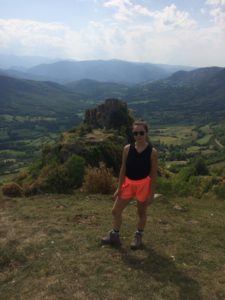Léna is a first year PhD student at Exeter University Business School in Penryn. She investigates the design of regenerative agriculture community-based systems that could potentially address both deforestation and food insecurity challenges. Léna collaborates with the NGO Cool Earth which creates partnerships with indigenous communities to tackle deforestation and climate change. Her research focuses on the projects Cool Earth has developed in Peru with Awajún and Asháninka communities.
I was only 15 days into my PhD when I left Cornwall to return to my home country: France. I did it with a heavy heart: I had just settled in Falmouth, had been warmly welcomed by people at university, as well as my flatmates. I tried to reassure my family by telling them this crisis was far from us, but they insisted it would reach us soon and that I should be back home as quickly as possible.
I booked my tickets and left three hours after. After a 17-hour trip including two trains, a long walk, a nap in Kings Cross station, a bus and a plane, I arrived in Toulouse two hours before France started its lockdown. It was on 17th of March.
I feel a lot has happened since that day, although when I think about it I mainly have been sitting in front of my computer or reading a book in my garden when sun shows up – which fortunately happens quite often in South of France!
Maybe this impression comes from all the emotional stages I have been through since the beginning of this crisis. First, it was denial: the pandemic would never hit us, I was safe in Cornwall (hence the fact I bought and cooked food for approximately a month the day before I left…).
Then, fear appeared: I was suddenly back home, and I did not know how I would be able to continue – or I could even start – my research. I was also scared about the impact of the virus on the indigenous communities I hope to be able to visit for my field work in the future. They have been able to block the access to their territories and therefore limit the spread of the virus for now. But in the case some of them would get sick, there is very little access to healthcare in the remote regions they inhabit. This situation could also worsen some challenges communities already face such as food insecurity. In fact, some villages are highly dependent on food imports, and difficulties in accessing external markets could result into a dramatic decrease of the amount and the quality of food included in their diet.
After fear came anger. I was recently talking to some friends in Mexico who were explaining to me that most of the Mexican population would not stay home. Many of them cannot afford to respect the lockdown since they are daily workers. Indeed, in Latin America and in many countries around the world, people have often to choose between staying home or feeding their families. This raises the question of inequalities among human beings to deal with this crisis. The disparities are not only economic but also social and educational. For instance, in France, up to 8% of children have not been able to attend online school.
This led to a phase of gratefulness. I focused on how lucky how was to have a job that I loved and that I can do remotely. Although it is hard to start a project from home, since it is a crucial period to train on research methods or build a network; I am aware that the work of many researchers has been deeply more affected than mine. All my wishes are with them and I really hope that solutions will be found to support them effectively.
I am also thankful for the constant support I received from University and especially from my supervisors. I am also able to keep in touch with the NGO I am collaborating with so this also means I can have regular updates on the situation in the communities.
Now, my goal is to stay positive and even become hopeful. Yes, the situation is dramatic, and life will very unlikely return to normal anytime soon. But is back to normality what we should be aiming for? Could we not take advantage of this unprecedented challenge to imagine a new societal organisation? And has not this change already started?
In France, for example, local food distribution channels have soared, and there is currently a big push from consumers to develop this system in the future months rather than going back to long and blurred supply chains.
In short, my current way to deal with the situation is to see it as a warning, an opportunity for us to change a system – which has many times shown and once again demonstrates its limits and dangers – as well as our own behaviour. How will this pandemic impact my projects in the medium and long term? Can my research contribute to presenting an alternative?
Staying home is an effort we are all doing. When we will be able to go out, where will we go? And what will we do?
I hope to be able to come back to Cornwall as soon as I can and connect with my peers to share opinions and perspectives on these open questions. In the meantime, I will be happy to do it remotely!
Written by: Léna Prouchet
Twitter: @LenaProuchet

